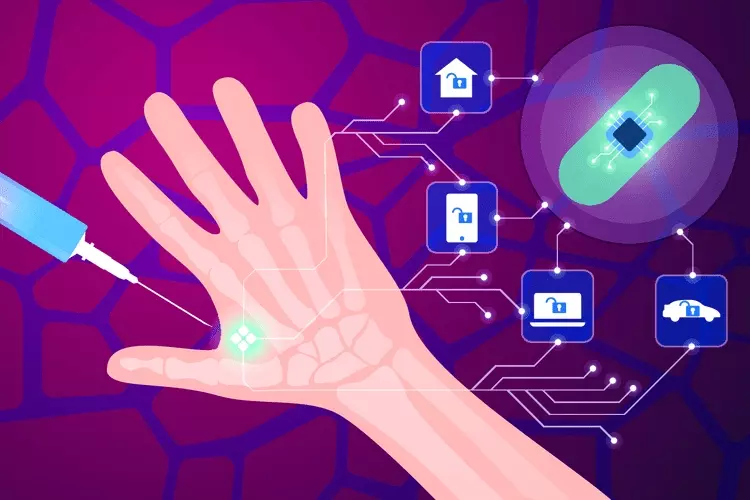Technology continues to get closer to merge with our bodies, from the smart phones in our hands to the smartwatches on our wrists to earbuds.
Now, it's getting under our skin literally with a tiny microchip. A human microchip implant is typically an identifying integrated circuit device or RFID (Radio-Frequency IDentification) transponder encased in silicate glass and implanted in the body of a human being. This type of subdermal implant usually contains a unique ID number that can be linked to information contained in an external database, such as personal identification, law enforcement, medical history, medications, allergies, and contact information.
In Sweden, thousands have had microchips inserted into their hands. The chips are designed to speed up users' daily routines and make their lives more convenient — accessing their homes, offices and gyms is as easy as swiping their hands against digital readers. Chips also can be used to store emergency contact details, social media profiles or e-tickets for events and rail journeys.
Advocates of the tiny chips say they're safe and largely protected from hacking, but scientists are raising privacy concerns around the kind of personal health data that might be stored on the devices. Around the size of a grain of rice, the chips typically are inserted into the skin just above each user's thumb, using a syringe similar to that used for giving vaccinations. Implanting chips in humans has privacy and security implications that go well beyond cameras in public places, facial recognition, tracking of our locations, our driving habits, our spending histories, and even beyond ownership of your data, which poses great challenges for the acceptance of this technology.
To understand the big picture about this technology, you need to know that the use of the chips is an extension of the concept of Internet of Things (IoT), which is a universe of connected things that keep growing by the minute with over 30 billion connected devices at the end of 2020, and 75 billion devices by 2025. Just as the world begins to understand the many benefits of the Internet of Things, but also learns about the ‘dark side’ from ‘smart everything,’ including our connected cities, we are now looking at small chips causing major new privacy challenges.
Like any new trend, in order for that trend to be accepted and become main stream, it needs to overcome three challenges: Technology, Business, and Society (regulations and laws)
The first challenge is Technology: which is advancing every day and the chips are getting smaller and smarter, in the world of IoT the chips are considered as the first element of a typical IoT system which consists of: Sensors, Networks, Cloud, and Applications. As a sensor, the chip touches upon your hand, your heart, your brain and the rest of your body —literally. This new development is set to give a very different meaning to ‘hacking the body’ or biohacking. While cyber experts continue to worry about protecting critical infrastructure and mitigating security risks that could harm the economy or cause a loss of life, implanted chips also affect health but add in new dimensions to the risks and threats of hacking of sensors as they considered as the weakest link in IoT systems.
The second challenge is Business: there are many companies in this field and the opportunities are huge with all aspects of replacing ID in stores, offices, airports, hospitals just to mention few. Also, chips will provide key physical data and further processing of that data in the cloud to deliver business insights, new treatments, and better services — presents a huge opportunity for many players in all types businesses and industries in private and public sectors.
The third challenge is Society: As individuals try to grapple with the privacy and security implications that come with technologies like IoT, big data, public- and private-sector data breaches, social media sharing, GDPR, a new California privacy law CCPA, along with data ownership and “right to be forgotten” provisions, along comes a set of technologies that will become much more personal than your smartphone or cloud storage history, and the tiny chip under your skin is sitting at the top of the list of these technologies, posing new risks and threats.
This challenge can be divided into two tracks: Government regulations like GDPR in EU and recent regulations in the US to ban forced usage of the chip for example, and consumer trust which is built on three pillars; SSP (Security, Safety and Privacy):
Safety is a major concern in using tiny chips inside your body including infection risks, MRI's use with chips, and corrosion of the chip’s parts.
Security and Privacy concerns deal with stolen identity, risk to human freedom and autonomy to mention few.

This technology is promising and another step towards more convenience and simplifying many of the daily tasks of billions of people around the world, but without solid security, safety and privacy measures applied when using this tiny chip, we will be facing a cybersecurity nightmare with far reaching consequences, in addition to an ethical dilemma in dealing with population who refused to use it is, they will be marginalized when it comes to jobs for instance. According to a recent survey of employees in the United States and Europe, two-thirds of employees believe that in 2035, humans with chips implanted in their bodies will have an unfair advantage in the labor market. One big concern raised by many privacy advocates is the creation of surveillance state tracking individual using this technology.
Too many moving parts to deal with, in this technology, until we answer all questions related to this technology, many people will look at it as another attempt of both governments and businesses to gain access to another piece of data about us and add it to many channels used now in gathering info. using our electronic devices, knowing that by 2030, there will be an average of 15 IoT devices for each person in the US.





Leave your comments
Post comment as a guest